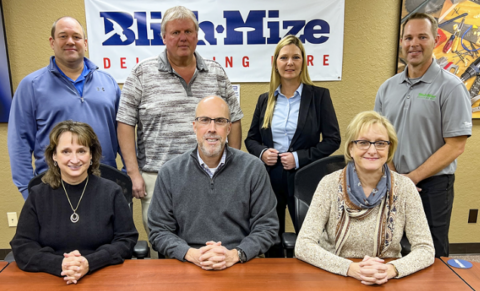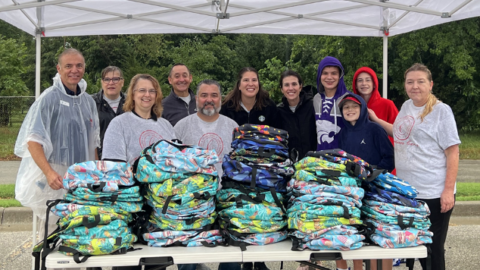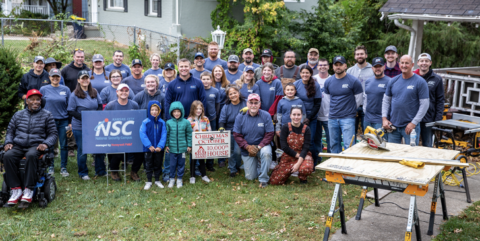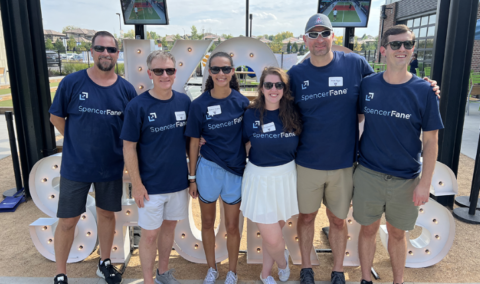HOME | ABOUT US | MEDIA KIT | CONTACT US | INQUIRE
HOME | ABOUT US | MEDIA KIT | CONTACT US | INQUIRE
The Great Recession of 2008. The global pandemic’s arrival in 2020. Soaring interest rates and inflation in the current climate. We’ve seen a lot of economic harm inflicted since the first Corporate Champions awards debuted in 2008. And once again, we as a community confront challenges ensuring that the least affluent among us have access to the most basic of life’s necessities.
Unfortunately, the months ahead may continue to be challenging for many cash-strapped outreach organizations. Ingram’s salutes them for the important and life-saving work many of them do at the very front lines of the Kansas City area’s efforts to help the needy. We also pause this holiday season to shine the light on companies that clearly go above and beyond in their efforts to make a difference in the communities in which they serve.
Different reasons lead companies to take different approaches to philanthropy. Clearly, needs among the community stretch beyond those of food, shelter and clothing. Education and the arts are key components of a community’s quality of life.
But if there are distinct common threads that run through these organizations, which hail from different industries and range dramatically in size and profitability, it’s that they all work smart, know themselves and the impact they’re capable of making, understand their core strengths and culture, have strong leadership and a keen sense of where they can be most effective in providing the most help. Above all else, they contribute to the best of their abilities simply because they believe it’s the right thing to do.
 Blish-Mize Co.
Blish-Mize Co.
Pound for pound, dollar for dollar, has any corporate citizen in this region had a bigger impact on its immediate community than hardware distributor Blish-Mize has had on Atchison? Not likely. Five generations deep as a family business, the company planted its philanthropic roots well more than a century ago with roles in the founding of the United Way campaign and YMCA there, with decades of additional financial support for Benedictine College, Theater Atchison and Fox Movie Theater, the Salvation Army, CASA, Boys & Girls Scouts, Catholic Charities of Northeast Kansas, Valley Hope, the city’s hospital (Amberwell Atchison), the Atchison Riverfront restoration and more. And at a company in business going on 153 years, the giving isn’t slowing down, either: Current CEO Jonathan Mize, second-great-grandson of a founding member, helped launch the Atchison Area Community Foundation in 2019, serving as its chairman and president. Starting with an empty bank account, the foundation now encompasses 54 individual funds with total assets of nearly $2 million. “We are very fortunate to give back to the Atchison and surrounding areas, to which we have donated for a very long time,” Mize says. “As long as we are profitable and thanking all of our customers who bring their business our way, that continues to make us profitable and allows us to give back.” The company’s tagline, he notes, is Delivering More. “So, no matter what we do, delivering more to our customers with our employees trying to go above and beyond in everything we do, the same could be said with us giving back to our community,” he says. “It’s not just about giving money, it’s getting involved, personally.” That’s not always easy, especially during tight budget years, he says. “Regardless, that’s the good thing about being a private company, in that we can decide what we want to support and not to support.” He leads an executive team that makes those calls, but history has shown that lean years have been comparatively few. Creating such an impact is one plus from serving a city that isn’t quite Kansas City metro but isn’t exactly rural, either. “Being in a small community has its benefits, as for the projects, programs, or organizations that we end up supporting, we get to see first-hand the accountability of our support and/or what it supported,” Mize says. “We are not a foundation or trust and do not require organizations to submit formal or detailed information regarding their organizations. We know who they are and what they do here in our community.”
 Commerce Bank
Commerce Bank
When you study the etymology, “Commerce” and “Community” don’t come from precisely the same Latin root—but the distinction isn’t great. No surprise, then, when you look for the wellspring of Commerce Bank’s philanthropy. “Our goal is to help the communities in which we live and work thrive, so that our customers, team members and neighbors can achieve their goals,” says Charlotte Kemper Black, director of the bank’s charitable trusts and foundations group. “To do so, we take a strategic, comprehensive approach that includes corporate philanthropic giving, community reinvestment, community service by team members and community partnerships.” The bank’s approach to philanthropy, she says, “is not one of a corporation clocking in and saying, ‘here’s what we want to do’. Instead, they’re collaborative with community partners and ask, ‘what is needed and how we can help?’” While the Commerce Bancshares Foundation makes its impact through philanthropic donations, generously benefitting the community, Commerce is constantly innovating and creating additional opportunities to connect its team members and the community. That never-ending search for connection has led the bank to assist non-profits that support community development, social needs, inclusive prosperity and a long list of causes. Employees receive paid time off every year to participate in volunteer outreach programs—potentially 36,500 hours of service, aggregated, in the service of more than 500 non-profits. Commerce supports more than 100 team members who lend their time, talents and passions to the missions of various non-profits. “Our philanthropic values are born from our company values and culture,” says Kevin Barth, chairman & CEO, Commerce Bank-Kansas City. “We believe in taking a long-term view, acting with integrity, focusing on our customers, and delivering excellence. We look for non-profit and community partners who do the same.” The bank funds a Community Development Officer who works closely with non-profits that promote financial stability, then uses those relationships to inform annual giving. Commerce also maintains ongoing relationships with the non-profits that receive funding, but begins each year with a fresh perspective. While some key community organizations receive regular support, decisions are also made based upon feedback from team members and leaders who are actively engaged with their communities.
 Cosentino Food Stores
Cosentino Food Stores
Sometimes, a company’s business model is its north star for philanthropy, too. Just ask John Cosentino: “We’re in the business of feeding families, so we wanted our philanthropic efforts to do the same,” says one of the lead executives for the family-owned group of grocers. “We know food insecurity is a growing issue, so it’s our mission to help where we can.” That started years ago, he says, while he watched television with his father. “A story highlighted that an area food bank’s shelves were bare,” Cosentino says. “My dad said to get a truck over there the next day. Now we donate around four trucks full of food a year.” Over the past five years, the Prairie Village-based company has donated more than $1 million to food banks alone. Those shipments are part of a broader giving strategy of coordinated corporate-wide and store-specific charitable efforts. “For example, we work with the other three Price Chopper owners on large, system-wide initiatives, like Harvesters’ programs,” Cosentino says. “On top of that, our charitable foundation gives to a range of groups, like the Mayor’s Christmas Tree Fund and the Bishop Sullivan Center. Our store directors also have the discretion to make donations specific to their area, helping a nearby school or a neighborhood family, for example. They know where a donation would make the most impact for their customers.” That line of work uniquely positions the company to address one of the most immediate needs in regional philanthropy: feeding the hungry. It comes with challenges that are unique, as well. “Whenever you’re dealing with food, safety is paramount,” Cosentino says. “It’s no different than managing in-store products to ensure we’re providing fresh, quality food.” Making its home in a region known for philanthropy provides added advantages: “Kansas City is a generous community, so we partner with a variety of groups that are equally passionate about eliminating hunger,” Cosentino says. “We’re also committed to keeping our philanthropic efforts local. This is our home—and we see it as our responsibility to help where we can. We work with highly reputable charitable organizations, so when we’re donating to an area food network, for example, we know our gift is being put to good use,” he says. “These are longtime partnerships, and they’ve served us well. … The way we see it, we’re all committed to strengthening our community—so let’s work together to have the biggest impact possible.”
 Honeywell/NSC
Honeywell/NSC
The maxim about charity’s three pillars of time, talent, and treasure is on full display at Honeywell Federal Manufacturing & Technology, which manages the Kansas City National Security Campus for the U.S. Department of Energy and the National Nuclear Security Administration. Site president Eric Wollerman walks you through it all: The time part includes an impressive 40 hours of paid annual leave for the 7,000 employees to volunteer at their favored non-profits. Talent? How about more than 100 staffers sitting on regional non-profit and civic boards to lend their business acumen? As for treasure, consider the most recent contract renewal, when it placed $1 million in escrow to fund its annual commitment of giving back grants and donations. “As our community relations initiatives matured, we reviewed community priorities that are important to the DOE and that are important to our community and our parent company, Honeywell,” he says. “With extensive leadership team input, we found tremendous synergies in the areas of environmental, education, and society.” Board service is a key strand in that weave of synergies. “It starts with a conversation about what our leaders are interested in and how we can inspire them to tap that desire and provide their talents for the greater good of our communities,” he says. “Our non-profit partners receive business-leader experience by populating their boards with different perspectives and strong business intelligence,” and to that task, they bring skills in finance, marketing, and problem-solving on an organizational level. “Our leaders gain an appreciation and understanding of people with varied backgrounds, who are different from their own and test their own leadership, creativity, innovation, and strategic planning skills.” As the company has engaged in hiring by the hundreds in recent years, one challenge is inculcating that commitment to service across an expanding work force. “KCNSC is creating a culture where we encourage anyone who is drawn to our mission to take an active part in our community,” Wollerman says. “Coming out of the pandemic, we logged more than 15,000 hours during our last fiscal year, up from 5,000 hours the previous year, and we expect it to grow next year. We believe the donation of time is equally impactful for organizations and those they serve, if not more impactful.”
 Spencer Fane
Spencer Fane
A law firm with 23 offices nationwide and now more than 500 lawyers is sitting on thousands of years of combined legal experience. That does indeed get put to charitable use with a muscular, award-winning pro-bono commitment—a full-time attorney and staff probing human-rights causes, child adoption and advocacy, domestic violence cases, and support services for refugees, immigrants, and military veterans. But, notes Kansas City managing partner Julia Vander Weele, there’s more to the firm’s philanthropy than free legal services—a lot more. “Our commitment to community stewardship extends beyond the practice of the law,” she says. “Many of our professionals actively participate in community boards and organizations, volunteer programs, and local philanthropic endeavors. Whether spending an afternoon making lunches for families staying at a Kansas City Ronald McDonald House, serving on the build team for a Nashville Habitat for Humanity project, funding school supplies for Phoenix teachers, or sponsoring charity events such as the Braden’s Hope Gala, KC CAN! Annual Gala, and United WE Listen: We Work For Change, Spencer Fane professionals believe who we are is how we do things.” The Spencer Fane Charitable Giving Program targets support for select local non-profits through multiple-year donations, with a goal of creating long-term relationships to engage staff. But more than just fulfilling staff passions to do good, she says, “We empower our client service teams to explore opportunities to support non-profit organizations that are also important to our clients.” To get there, Spencer Fane convenes committees in each of its markets to evaluate the impact and administer programs. In Kansas City, that entails four partners and several administrative professionals to oversee a structured program to recruit applications for the annual grants. It follows that up, on the accountability side, by asking its partner non-profits to identify opportunities for firm employees to be involved in other ways, usually as volunteers. Recognizing how deeply the arts are woven into the fabric of the region, she says, the firm has steered funding to dance, drama and music, assisting a wide variety of popular venues and groups, including The Folly Theater, Midwest Music Foundation, Charlotte Street Foundation, Lyric Opera and more.